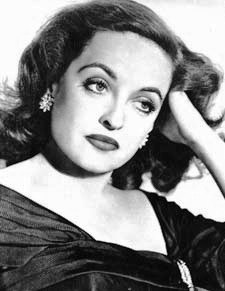Bette Davis

Jack Warner remembered Bette Davis as "an explosive little broad with a straight left." Her screen persona (which apparently matched her behind-the-scenes decorum hand by glove) was singularly aggressive for a woman in Hollywood: not a friendly rival like Katharine Hepburn, nor a boudoir panther like Mae West, but a volcano that could erupt without warning and spit hellfire down on whatever and whomever was in her path.
Born on this day in 1908 in Lowell, Massachusetts, Ruth Elizabeth Davis decided to be an actress while in high school, and clawed her way into the business: Eva Le Gallienne turned her down when she came to study; George Cukor fired her on her first professional stage gig in Rochester, New York; Carl Laemmle said she had "as much sex appeal as Slim Summerville" after Universal gave her a contract.
She switched to Warners and had to fight to be loaned out to RKO to star in her first screen success, as the malicious waitress in Of Human Bondage (1934, with Leslie Howard). The following year she won her first Oscar for Dangerous, scored another great part in The Petrified Forest (1936, with Howard and Humphrey Bogart), but fretted mightily over the lily-thin roles she was being offered at Warner Brothers. After refusing one and being suspended without pay, she sued the studio; she lost, but she did manage to earn the respect of the studio heads (earning the nickname, the "Fifth Warner Brother"), who began to cultivate the appropriate material for her -- material which showcased her bitter, smoky voice, her justly canonized eyes (almost too large for their sockets, lit by planetoidal irises of unstable orbit) and her bitchy skittishness, which seemed to be the brittle veneer within which was contained a maelstrom of unharnessed malevolent energy.
Women loved her star vehicles (such as Jezebel, 1938, which brought her a second Oscar; Dark Victory, 1939; The Letter, 1940; The Little Foxes, 1941; Now, Voyager, 1942), as much for their romantic content as for the way in which Davis gave unambiguous catharsis to women's private frustrations. Her star was fading slightly when she scored another hit in All About Eve (1950), a brilliant performance which summed up all the facets of the Davis persona and earned her best actress awards at Cannes and by the New York City film critics.
By the mid-1950s, however, her career was in sharp decline, prompting her to place a half-joking full-page ad in the trades looking for "steady employment" in Hollywood. In 1962 came another David boomlet, this time in the horror genre (perhaps a culturally plausible extension of the neuroses played out by the Davis persona in the 1940s) in Whatever Happened to Baby Jane? (1962, with Joan Crawford; best actress Oscar nomination) and Hush Hush . . .Sweet Charlotte (1964). She spent her final years doing prestige TV productions and star cameos, working almost to the time of her death from breast cancer at age 81.
Labels: Classic Cinema





0 Comments:
Post a Comment
Subscribe to Post Comments [Atom]
<< Home